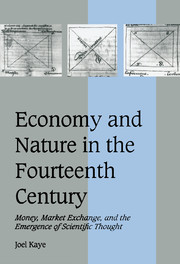 Economy and Nature in the Fourteenth Century
Economy and Nature in the Fourteenth Century Book contents
- Frontmatter
- Contents
- Acknowledgments
- INTRODUCTION
- 1 THE ECONOMIC BACKGROUND: MONETIZATION AND MONETARY CONSCIOUSNESS IN THE THIRTEENTH AND FOURTEENTH CENTURIES
- 2 THE ARISTOTELIAN MODEL OF MONEY AND ECONOMIC EXCHANGE
- 3 THE EARLIEST LATIN COMMENTARIES ON THE ARISTOTELIAN MODEL OF ECONOMIC EXCHANGE: ALBERTUS MAGNUS AND THOMAS AQUINAS
- 4 MODELS OF ECONOMIC EQUALITY AND EQUALIZATION IN THE THIRTEENTH CENTURY
- 5 EVOLVING MODELS OF MONEY AND MARKET EXCHANGE IN THE LATE THIRTEENTH AND FOURTEENTH CENTURIES
- 6 LINKING THE SCHOLASTIC MODEL OF MONEY AS MEASURE TO PROTO-SCIENTIFIC INNOVATIONS IN FOURTEENTH-CENTURY NATURAL PHILOSOPHY
- 7 LINKING SCHOLASTIC MODELS OF MONETIZED EXCHANGE TO INNOVATIONS IN FOURTEENTH-CENTURY MATHEMATICS AND NATURAL PHILOSOPHY
- Bibliography
- Index
- Cambridge Studies in Medieval Life and Thought Fourth series
INTRODUCTION
Published online by Cambridge University Press: 16 July 2009
- Frontmatter
- Contents
- Acknowledgments
- INTRODUCTION
- 1 THE ECONOMIC BACKGROUND: MONETIZATION AND MONETARY CONSCIOUSNESS IN THE THIRTEENTH AND FOURTEENTH CENTURIES
- 2 THE ARISTOTELIAN MODEL OF MONEY AND ECONOMIC EXCHANGE
- 3 THE EARLIEST LATIN COMMENTARIES ON THE ARISTOTELIAN MODEL OF ECONOMIC EXCHANGE: ALBERTUS MAGNUS AND THOMAS AQUINAS
- 4 MODELS OF ECONOMIC EQUALITY AND EQUALIZATION IN THE THIRTEENTH CENTURY
- 5 EVOLVING MODELS OF MONEY AND MARKET EXCHANGE IN THE LATE THIRTEENTH AND FOURTEENTH CENTURIES
- 6 LINKING THE SCHOLASTIC MODEL OF MONEY AS MEASURE TO PROTO-SCIENTIFIC INNOVATIONS IN FOURTEENTH-CENTURY NATURAL PHILOSOPHY
- 7 LINKING SCHOLASTIC MODELS OF MONETIZED EXCHANGE TO INNOVATIONS IN FOURTEENTH-CENTURY MATHEMATICS AND NATURAL PHILOSOPHY
- Bibliography
- Index
- Cambridge Studies in Medieval Life and Thought Fourth series
Summary
Intellectual innovations within fourteenth-century natural philosophy occupy an important place in the history of scientific thought. Over the course of the century, philosophers subjected elements of the Aristotelian model of the natural world to critical analysis, advancing claims of logic, mathematical consistency, and empirical evidence against Aristotelian authority. The selective critique of Aristotle was informed by a wealth of new questions and innovative speculations. Beneath these speculations lay a profound reconceptualization of nature.
In broad terms, the conceptual landscape that emerged in the fourteenth century resulted from a striking shift in the models derived to represent order and activity in the natural world: from a static world of numbered points and perfections to a dynamic world of ever-changing values conceived as continua in expansion and contraction; from a mathematics of arithmetical addition to a mathematics of geometrical multiplication, newly accepting of the approximate and the probable; from a world of fixed and absolute values to a shifting, relational world in which values were understood to be determined relative to changing perspectives and conditions; and from a philosophy focused on essences and perfections to one dominated by questions of quantification and measurement in respect to motion and change. Each of these new directions proved to be of great importance to the future of scientific thought.
Proto-scientific speculation in the fourteenth century developed within the rigorous intellectual culture of the university, particularly at Paris and Oxford.
- Type
- Chapter
- Information
- Economy and Nature in the Fourteenth CenturyMoney, Market Exchange, and the Emergence of Scientific Thought, pp. 1 - 14Publisher: Cambridge University PressPrint publication year: 1998


